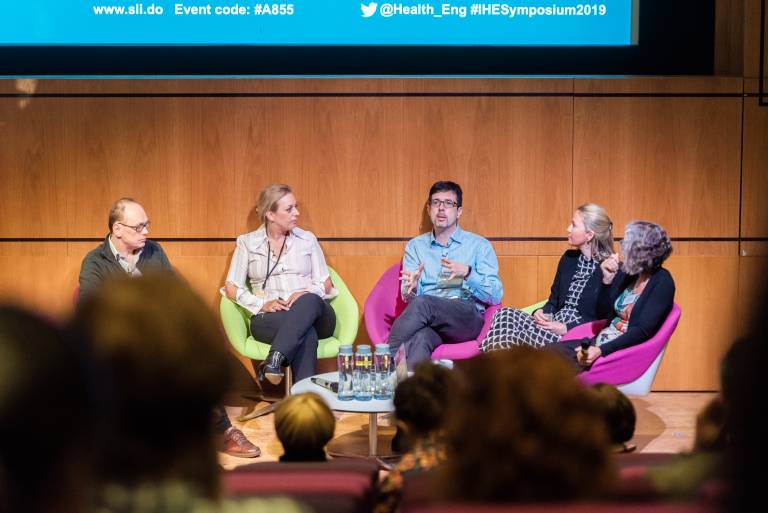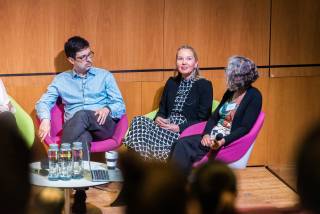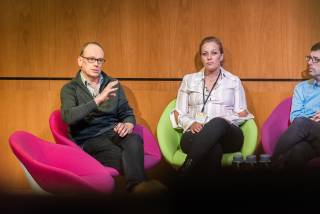BLOG: Panel discussion on technologies for healthy ageing
11 December 2019
This blog by Prof Ann Blandford follows the panel discussion around technologies to enable healthy ageing at UCL Institute of Healthcare Engineering's Autumn Research Symposium, November 2019.

Panel members were Danny Alexander, Evangelia Chrysikou (Lia), Sergi Costafreda Gonzalez and Mine Orlu, and the panel was chaired by Ann Blandford.
Questions from the Chair and the audience provoked lively discussion and panel members brought different perspectives to the challenges of healthy ageing. Danny’s focus is on medical imaging, particularly brain imaging and the application of Artificial Intelligence (AI) techniques to biomarkers (including, but not limited to, images) to predict disease staging and progression for people with Alzheimer’s disease. Sergi also conducts research on dementia, with a focus on the impact of hearing loss on cognition. Lia’s research is on the role of architecture and the built environment in health and wellbeing, taking a systems perspective. Mine works at the interface between clinical pharmacy and pharmaceutics, enabling older patients to have access to safe, effective and acceptable drug delivery systems.
When asked about key factors that will shape the way people age in the future, panel members identified various themes. These included designing to facilitate physical activity, tackling obesity from childhood and improving medications management, particularly for people who are managing multiple health conditions. Sergi emphasised the importance of addressing cardio-vascular risk factors (what is good for your heart is good for your brain) and participating in social activities: “For many people, going out for coffee with a friend is more cognitively stimulating and more helpful for combatting cognitive decline than doing crosswords or Sudoku”.
The panel agreed that we need to reduce the stigma around the idea of ageing, and to see ageing as a time for new opportunities and a time of wisdom. Such a reframing of ageing could boost positive feelings about getting older and stimulate societal and industry investment into this area.
Our government’s Grand Challenge mission in this area aims to “Ensure that people can enjoy at least 5 extra healthy, independent years of life by 2035”. When asked what key advances will contribute to this mission, panel members highlighted the importance of access to quality space, therapeutics tailored to the needs of older patients, and technology support that helps people manage both physical and cognitive decline, enabling them to remain in their own homes for longer. We recognised that this requires engagement from local communities – valuing the contributions of people of all ages and capabilities. The panel also noted that ageing begins from the moment of conception, and that it is important to think about how we can enable healthy ageing across the entire lifecourse. This might remove the need for some later interventions and promote improved experiences of healthy living across all ages.
There was far too much to discuss, and too little time, so the panel didn’t have time to address the questions that were submitted over sli.do. We discussed these off-line after the meeting, and summarise that discussion here.

Additional questions and responses
Q: How might we expect healthcare or healthy ageing to change with fully integrated digital patient information across primary, secondary and tertiary care?
A: Fully joined up care is something we must work towards. Too often, the individual (or a carer) acts as the “glue” between disconnected health systems and information can be lost along the way. Lost information (e.g., about allergies) compromises patient safety. Conversely, patients are asked to give the same information to multiple care providers, which is tedious, inefficient, and “uncaring”. With integrated patient information (which might include selected data from people’s daily lives), there should be many more opportunities to identify trends, intervene earlier, and intervene appropriately. It is, however, important that the individual be at the heart of this, respecting their autonomy and their choices.
Q: Experiences of disabled people suggest their healthy ageing is lower priority. Can technology help us move from crisis intervention to affordable prevention?
A: One of the challenges is to enable people of all abilities and circumstances to live the best possible lives. Hopefully, with novel technologies (such as 3D printing) and new styles of data analysis that take account of richer data types (genetic, environmental, etc.), we will find ways to advance affordable prevention that is contextualised to the needs of each individual, whatever their circumstances.
Q: What advice would you give to a carer of an octogenarian/nonagenarian, who themselves are reaching their 60s? How can they ensure healthy ageing?
A: Connection with the community is very important for the wellbeing of the carer. It’s important to look after oneself as well as others, and to establish the resources and infrastructure to do that. For example, this will include making time to ensure that carers eat well, take exercise, and have “me time”. This should include new kinds of technology support that takes into account the needs of carers as well as those they are caring for, and health and social care systems that consider the needs of carers as well as “patients”.
Q: With machine learning what reminders will help people who have early stage cognitive impairment?
A: What machine learning might do is provide the potential to learn what reminders would be useful to each individual rather than relying on generic reminder systems that people will ignore if most is not relevant to them. It’s not just reminders, though, as different capabilities are diminished for different people; for example, some might need help with navigating or planning journeys on public transport; others might need reminders for recognising friends and acquaintances; yet others might benefit from help in planning meals or taking medications. It’s about personalising digital companions for daily living.
Q: How do you get around the issues of older people being less technologically savvy for using new technologies?
A: This will change as the first generation of people who have worked intensively with IT technology start to retire. Design should be simple and also take into account the changes that can come with ageing: less visual acuity, hearing loss, dexterity issues.
Q: How easy is it to implement healthcare technologies to the older generation who aren’t used to some of these newer advances?
A: This is certainly an issue for some people, but by no means all. In some cases, it’s about creating technologies that are easier for everyone to use (we will all benefit). In other cases, it’s about creating communities where people can share their different skills to support each other. It is important not to design essential services that rely on individuals having high technology literacy without providing alternative means of accessing those services simply. There is also great potential in intergenerational activities that benefit both younger and older: for example grantparents engaging with grandchildren to learn coding can all benefit for different reasons.
Q: What are some specific drug technologies that you envisage being realised in the next coming decades that will help healthy aging?
A: Novel fabrication technologies such as 3D printing possess great potential to design and develop medicinal products tailored to the needs of older people. The sophisticated dosage form includes features such as optimised size and texture of oral medicine to ease swallowing. Electrospinning is promising scalable technology enabling the development of combined therapies including multiple drugs for managing co-morbidities in ageing population. Smart packaging technologies are also critical for enabling self-administration of medicine, in particular for treatment of chronic conditions.
Q: Much of discussion is on social changes and medical advice. What key Engineering developments do you see as being useful?
A: Some areas that are looking promising are: better predictive models for early diagnosis and treatment care or prevention decisions; better, cheaper and faster imaging techniques for wider screening; in home assistive technologies; and digital health apps promoting healthy living. Engineering also offers the potential to facilitate prevention, to increase the accuracy of interventions, and to deliver technologies that are more personalised and “friendly”.

Overall
Overall, the discussion emphasised the huge range of needs and opportunities for engineering, along with social, medical and pharmaceutical advances, to improve lives from pre-conception to end of life. The panel highlighted the potential of cross-disciplinary approach in overcoming healthcare related challenges experienced by an ageing population. The synergy of engineering sciences with medical, pharmaceutical and social disciplines holds great promise in enabling greater independence and quality of life at all stages of living.
Autumn Research Symposium
Our Autumn Research Symposium is an annual event to showcase healthcare engineering across UCL and an opportunity for our community to connect. Find out more about this year's symposium on 5 November by reading our write-up here.
 Close
Close

